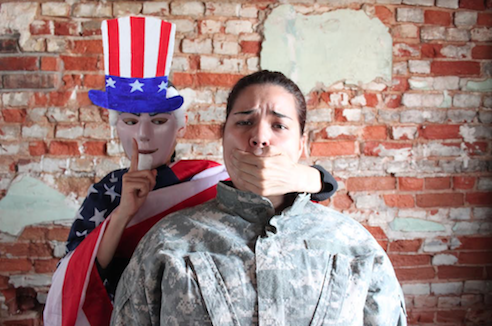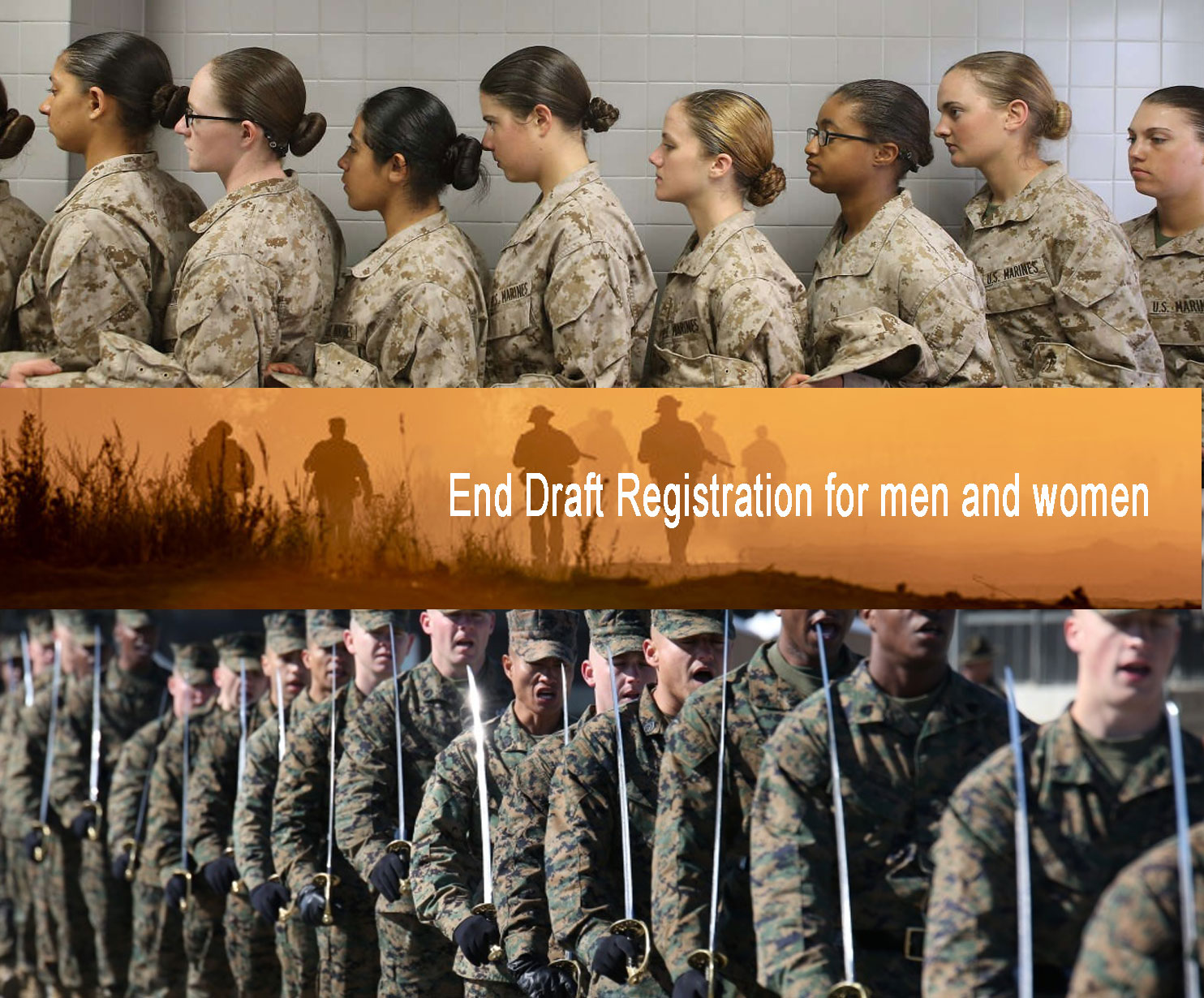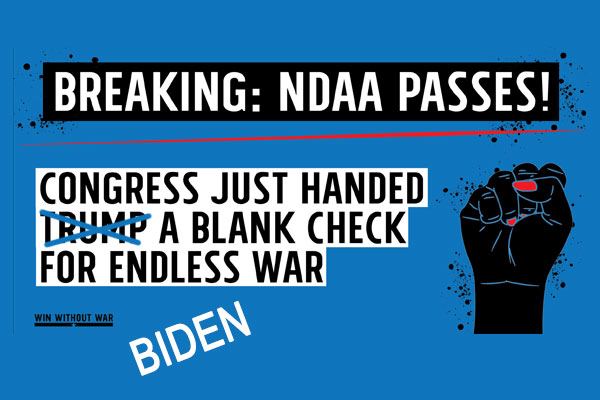El alistamiento en las Fuerzas Armadas es una decisión muy importante. |English
https://nnomy.org/ConsiderandoEnlistarse
 Antes de alistarse, piense detenidamente en lo que significa ser soldado durante ocho años. Todos los miembros de las fuerzas armadas, desde el médico hasta el mecánico, están entrenados para luchar y matar, y los conflictos en curso demuestran que la lucha y la matanza pueden comenzar muy de repente. Puede alistarse para obtener capacitación laboral o dinero para la universidad, pero eventualmente puede enfrentarse a una guerra. Te debes a ti mismo pensar seriamente cuando crees que está justificado matar a otra persona.
Antes de alistarse, piense detenidamente en lo que significa ser soldado durante ocho años. Todos los miembros de las fuerzas armadas, desde el médico hasta el mecánico, están entrenados para luchar y matar, y los conflictos en curso demuestran que la lucha y la matanza pueden comenzar muy de repente. Puede alistarse para obtener capacitación laboral o dinero para la universidad, pero eventualmente puede enfrentarse a una guerra. Te debes a ti mismo pensar seriamente cuando crees que está justificado matar a otra persona.
Muchos de los detalles sobre el alistamiento no se explican bien a las personas que están considerando unirse al ejército. Es posible que los reclutas no comprendan los detalles del acuerdo de alistamiento, la posibilidad de fraude de reclutadores, las limitaciones de los fondos universitarios disponibles a través del ejército y los problemas que enfrentan los veteranos cuando dejan las fuerzas armadas. Es importante aprender todo lo que pueda antes de unirse. Recuerde que si se alista y decide que no le gusta, no puede renunciar.
Cuando visite la oficina de contratación:
- Lleve a un padre o amigo como testigo.
- Lea todo el acuerdo de alistamiento con mucho cuidado.
- Obtenga todas las promesas por escrito. Las promesas habladas no tienen que cumplirse.
- Antes de firmar cualquier documento, llévelo a casa y discútalo con sus padres, amigos y un consejero capacitado que entienda cómo operan los reclutadores. Su reclutador debe darle una copia del acuerdo si lo solicita.
- Obtenga copias de todo lo que firme.
El acuerdo de alistamiento
El acuerdo de alistamiento no es un contrato. Es un acuerdo unidireccional que es vinculante para el recluta pero no vinculante para los militares. El acuerdo establece que el alistado tiene "derecho a recibir pago, subsidio y otros beneficios, según lo dispuesto por la ley y el reglamento". Sin embargo, el acuerdo de alistamiento también establece: “Las leyes y reglamentos que rigen al personal militar pueden cambiar sin previo aviso. Dichos cambios pueden afectar su estado, salario, asignaciones, beneficios y responsabilidades como miembro de las Fuerzas Armadas, INDEPENDIENTEMENTE de las disposiciones de este documento de alistamiento / reenganche”.
Este lenguaje significa que el ejército no tiene que cumplir ninguna promesa hecha en el momento de su alistamiento. Sin embargo, debes dar ocho años de tu vida, obedecer todas las órdenes y posiblemente matar o morir. Puede estar sujeto a riesgos para la salud, discriminación y abuso físico o emocional. Sus superiores pueden decidir recortar su salario o beneficios sin siquiera decírselo. Incluso la colocación laboral que le prometió el reclutador puede cambiar en cualquier momento. Si se niega a obedecer las órdenes, puede ser disciplinado, enfrentarse a un consejo de guerra y tal vez recibir un despido deshonroso.
Fraude de reclutadores
Cualquier recluta potencial debe darse cuenta de que su reclutador no es un maestro o un consejero, sino un vendedor. Los reclutadores están bajo una gran presión para reclutar a un cierto número de personas cada mes; si no lo hacen, pueden perder privilegios, bonificaciones y pueden ser transferidos del comando de reclutamiento. El fraude en los reclutadores se ha convertido en un problema grave en el ejército. Cuatrocientos reclutadores fueron relevados en un período de tres años por mala conducta. A veces, los reclutadores intentan convencer a los alistados de que mientan sobre el acuerdo de alistamiento, para proporcionar información falsa para que lo acepten en el servicio. También pueden mentirle a usted o a su familia.
En el "Registro de procesamiento militar", por ejemplo, se le harán preguntas sobre su carácter y ajuste social. Estas preguntas se refieren al uso previo de drogas, la participación en el comunismo, si es o no objetor de consciencia a la guerra y si ha tenido problemas con el ejército anteriormente. Todas estas categorías son consideradas defectos de carácter por los militares, y cualquiera que se ajuste a estas categorías se considera no apto para el ejército. Al completar el formulario de alistamiento, los reclutadores frecuentemente sugieren que mientas, particularmente en esta sección. No mientas. Cuando se descubre información fraudulenta, a menudo el recluta es el único castigado.
Los reclutadores casi siempre dicen que las fuerzas armadas son emocionantes y aventureras: que aprenderás una habilidad, ganarás dinero para la universidad y ganarás liderazgo y disciplina. Tu reclutador está vendiendo algo. Muchas de las promesas simplemente no son ciertas.
¿Formación profesional? ¿Beneficios universitarios?
El reclutador probablemente hará hincapié en el equipo sofisticado de alta tecnología con el que podrás trabajar. Es cierto que algunos soldados están entrenados para trabajos altamente calificados. Generalmente, sin embargo, esos trabajos son para el soldado que ya estaba entrenado, educado y técnicamente capacitado antes de unirse al ejército. Muchos de los trabajos de alta calificación serán para soldados que ya tienen al menos dos años de universidad. Y, a menudo, el trabajo de alta tecnología lo realizan contratistas civiles que tienen la capacitación y las habilidades necesarias.
En realidad, pocas asignaciones militares podrían describirse como de alta tecnología, aunque muchos de los trabajos parecen de alta tecnología. Por ejemplo, un folleto del Ejército de EE. UU. Incluye asignaciones con títulos como "ingeniería de combate", "ingeniería general", "suministro y servicio" y "servicio de alimentos". Estas asignaciones, y otras ofrecidas por los militares, probablemente ofrecerían poco más que trabajo manual de baja calificación. Las fuerzas armadas simplemente no tienen el tiempo, la necesidad o los recursos para capacitar a muchos reclutas para un trabajo altamente calificado.
Sobre todo, el ejército existe para la guerra. La mayoría de los soldados estarán entrenados para luchar y matar, habilidades que no se pueden comercializar en el mundo civil. Por lo tanto, no es probable que pueda transferir la experiencia adquirida en el ejército a una carrera civil. Un estudio de la Universidad Estatal de Ohio mostró que solo el 12 por ciento de los hombres y el 6 por ciento de las mujeres en un grupo de muestra hicieron uso de sus habilidades militares en un trabajo civil. El especialista del Cuerpo Médico, por ejemplo, puede obtener crédito solo por “primeros auxilios” cuando solicita la escuela de enfermería.
Mucha gente se une al ejército por dinero para la universidad; el Ejército anuncia que proporciona hasta $ 60,000 para la universidad. Sin embargo, para recibir esa cantidad de dinero, debe aceptar una categoría de trabajo militar difícil de cubrir; debe completar su período de alistamiento y debe recibir una buena baja. Incluso si cumple con todos estos criterios, su comandante puede decidir que aún no es elegible para una parte o la totalidad del dinero. Los soldados que deciden que no pueden asistir a la escuela pierden todo el dinero.
Entre los crecientes costos de la educación superior y las múltiples restricciones que el ejército impone al dinero de las becas, muchos soldados descubren que el dinero que reciben de los militares no es suficiente para ir a la universidad. Pocos soldados encuentran las oportunidades educativas que los militares dicen brindar. Martin Smith, un representante de empleo de veteranos, calcula que solo el 20 por ciento de los veteranos con los que ha trabajado tomó clases adicionales en el servicio y que "ese 20 por ciento parecían ser los niños inteligentes de todos modos".
RACISMO EN EL MUNDO MILITAR
El ejército tiene políticas para superar el racismo en sus filas. A pesar de su estructura autoritaria, no lo ha logrado.
Durante las guerras actuales, los árabes han sido etiquetados como "cabezas de toalla" o "negros de arena", mientras que hubo informes de quemas cruzadas y reuniones del KKK por motivos militares. Durante la Guerra del Golfo Pérsico, por ejemplo, la mitad de las tropas desplegadas eran negras, mientras que era más probable que los soldados blancos permanecieran en los Estados Unidos o estuvieran estacionados en otro lugar.
Las pocas oportunidades que existen en el ejército benefician principalmente a los soldados blancos educados. Mientras que un tercio de los alistados son personas de color, solo el 11 por ciento de los oficiales lo son. Los alistados no blancos tienden a conseguir trabajos de baja habilidad relacionados con el combate. Un número desproporcionado de afroamericanos y latinos se enfrentan a tribunales marciales y reciben bajas negativas. Uno de cada tres negros tendrá una descarga grave.
MUJERES Y MILITARES
El mensaje tácito que siguen transmitiendo los militares es que la guerra es para hombres y que las mujeres deben mantenerse alejadas. La mitad de todas las mujeres en el ejército están asignadas a roles tradicionales como cocinar, enfermería y tareas de secretaría.

Las violaciones y el acoso sexual ocurren con frecuencia en las fuerzas armadas. Un informe indicó que el 64 por ciento de las mujeres en el ejército han sufrido acoso sexual. A menudo, los hombres usan el rango para tratar de obtener favores sexuales. Las mujeres que se negaron a obedecer han sido etiquetadas como lesbianas.
Y después de que dejes las fuerzas armadas...
Los soldados a menudo son despedidos sin dinero para continuar en el mundo civil y sin habilidades laborales transferibles. Las líneas de desempleo están llenas de veteranos que están mal calificados y carecen de las habilidades útiles para el empleo civil. Muchos veteranos permanecen sin trabajo durante largos períodos y son una gran parte de la población carcelaria y sin hogar. Incluso aquellos que tienen un empleo remunerado permanecerán a la zaga de sus homólogos civiles en cuanto a ingresos y avances durante el resto de sus carreras. Una vez que haya estado en el ejército, no podrá ponerse al día con el resto del mundo.
Los militares también se quedan contigo de otras maneras. Gran parte del atractivo es la idea de demostrar tu valía, desarrollar la disciplina, ser "todo lo que puedes ser". Quizás quieras llevar contigo el “orgullo del ejército” toda tu vida. Sin embargo, recuerde que esto es solo una parte de la imagen. Nadie puede participar en la violencia y permanecer indemne o indiferente. Siempre serás parte de la destrucción que apoyaste. Y si Estados Unidos libra una guerra, es posible que nunca puedas olvidar a las personas que mataste. Para algunas personas, el peso de estos recuerdos es demasiado pesado para soportarlo. La tasa de suicidios entre los veteranos de Vietnam es muchas veces superior al promedio nacional.
Alistarse en el ejército es un compromiso serio. Antes de unirse, sepa qué hay en la letra pequeña. Conozca todos los detalles y elija lo que sea mejor para usted. Piénselo.
Fuente: https://centeronconscience.org/advice-to-those-considering-military-enlistment/
Fuentes: Bixby, Lyn, “Many Recruiters Use Fraud to Sell the Service,” The Hartford Courant, December 17, 1989./ Brown, Darryl, “Job Training In the U.S. Military,” Youth Policy, Youth Policy Institute, Inc., August 1986./ Joseph, Toni, “Rude Awakening, Many Veterans Find Military Jobs No Road to Success,” The Wall Street Journal, October 9, 1985./ Laurence, Janice H., Peter F. Ramsberger and Monica A. Gribben, “Effects of Military on Low Aptitude Men,” Human Resources Research Organization (Sponsor: Office of the Assistant Secretary of Defense), December 1989./ Wilson, George C., “Marines Discover Fraud in Pittsburgh Recruiting,” Washington Post, March 8, 1989./ “Anything to Enlist Recruits.” Albany Times Union, June 30, 1993.
Recursos
#GoArmy | #GoMarines | #GoNavy | #BeforeYouEnlist | #ConsiderandoEnlistarse | #NNOMYpeace
Considere convertirse en un partidario de $ 10 por mes de la Red Nacional que se Opone a la Militarización de la Juventud
Y nuestro trabajo para desmilitarizar nuestras escuelas y jóvenes.
Donar aquí
Revised 4/30/2021
 16/04.2021 / Edward Hasbrouck / Antiwar.com - The Selective Service Repeal Act of 2021 (H.R. 2509 and S. 1139) was introduced in Congress on April 14th 2021 with bipartisan support in both the House and the Senate.
16/04.2021 / Edward Hasbrouck / Antiwar.com - The Selective Service Repeal Act of 2021 (H.R. 2509 and S. 1139) was introduced in Congress on April 14th 2021 with bipartisan support in both the House and the Senate.


 Gary Ghirardi / NNOMY - A not surprising but concerning feature of the 2021 National Defense Authorization Act is the doubling of the Junior Reserve Officers Training Corps in our public schools and the expansion of DoD STEM and of the STARBASE Program into territories that the United States of America controls in the Pacific.
Gary Ghirardi / NNOMY - A not surprising but concerning feature of the 2021 National Defense Authorization Act is the doubling of the Junior Reserve Officers Training Corps in our public schools and the expansion of DoD STEM and of the STARBASE Program into territories that the United States of America controls in the Pacific.



 The warning, given to me 25 years ago, came at the moment Pat Robertson and other radio and televangelists began speaking about a new political religion that would direct its efforts at taking control of all institutions, including mainstream denominations and the government. Its stated goal was to use the United States to create a global, Christian empire. It was hard, at the time, to take such fantastic rhetoric seriously, especially given the buffoonish quality of those who expounded it. But Adams warned us against the blindness caused by intellectual snobbery. The Nazis, he said, were not going to return with swastikas and brown shirts. Their ideological inheritors had found a mask for fascism in the pages of the Bible. - Chris Hedges (From his article:
The warning, given to me 25 years ago, came at the moment Pat Robertson and other radio and televangelists began speaking about a new political religion that would direct its efforts at taking control of all institutions, including mainstream denominations and the government. Its stated goal was to use the United States to create a global, Christian empire. It was hard, at the time, to take such fantastic rhetoric seriously, especially given the buffoonish quality of those who expounded it. But Adams warned us against the blindness caused by intellectual snobbery. The Nazis, he said, were not going to return with swastikas and brown shirts. Their ideological inheritors had found a mask for fascism in the pages of the Bible. - Chris Hedges (From his article: 



 David Swanson is the author of the new book, Daybreak: Undoing the Imperial Presidency and Forming a More Perfect Union, by Seven Stories Press and of the introduction to The 35 Articles of Impeachment and the Case for Prosecuting George W. Bush by Dennis Kucinich. In addition to cofounding AfterDowningStreet.org, he is the Washington director of Democrats.com and sits on the boards of a number of progressive organizations in Washington, DC.
David Swanson is the author of the new book, Daybreak: Undoing the Imperial Presidency and Forming a More Perfect Union, by Seven Stories Press and of the introduction to The 35 Articles of Impeachment and the Case for Prosecuting George W. Bush by Dennis Kucinich. In addition to cofounding AfterDowningStreet.org, he is the Washington director of Democrats.com and sits on the boards of a number of progressive organizations in Washington, DC. Jorge Mariscal is the grandson of Mexican immigrants and the son of a U.S. Marine who fought in World War II. He served in the U.S. Army in Vietnam and currently teaches at the University of California, San Diego.
Jorge Mariscal is the grandson of Mexican immigrants and the son of a U.S. Marine who fought in World War II. He served in the U.S. Army in Vietnam and currently teaches at the University of California, San Diego. Matt Guynn plays the dual role of program director and coordinator for congregational organizing for On Earth Peace, building peace and nonviolence leadership within the 1000+ congregations of the Church of the Brethren across the United States and Puerto Rico. He previously served a co-coordinator of training for Christian Peacemaker Teams, serving as an unarmed accompanier with political refugees in Chiapas, Mexico, and offering or supporting trainings in the US and Mexico.
Matt Guynn plays the dual role of program director and coordinator for congregational organizing for On Earth Peace, building peace and nonviolence leadership within the 1000+ congregations of the Church of the Brethren across the United States and Puerto Rico. He previously served a co-coordinator of training for Christian Peacemaker Teams, serving as an unarmed accompanier with political refugees in Chiapas, Mexico, and offering or supporting trainings in the US and Mexico. Rick Jahnkow works for two San Diego-based anti-militarist organizations, the Project on Youth and Non-Military Opportunities and the Committee Opposed to Militarism and the Draft. He can be reached at:
Rick Jahnkow works for two San Diego-based anti-militarist organizations, the Project on Youth and Non-Military Opportunities and the Committee Opposed to Militarism and the Draft. He can be reached at:  Pat Elder was a co-founder of the
Pat Elder was a co-founder of the 
 Edward Hasbrouck grew up in Wellesley, Massachusetts, a suburb of Boston. He considers myself primarily a political activist. Hasbrouck began his resistance to the violence of illegitimate authority as an elected but nonvoting student representative to the local school board and as an activist for peace, disarmament, and students' rights. His first book was a handbook for high school students on their legal rights co-authored in the summer of 1977, between high school and college, as an intern for the student service bureau of the Massachusetts Department of Education. He majored in political science at the University of Chicago until leaving school to pursue direct involvement in political activism.
Edward Hasbrouck grew up in Wellesley, Massachusetts, a suburb of Boston. He considers myself primarily a political activist. Hasbrouck began his resistance to the violence of illegitimate authority as an elected but nonvoting student representative to the local school board and as an activist for peace, disarmament, and students' rights. His first book was a handbook for high school students on their legal rights co-authored in the summer of 1977, between high school and college, as an intern for the student service bureau of the Massachusetts Department of Education. He majored in political science at the University of Chicago until leaving school to pursue direct involvement in political activism.




